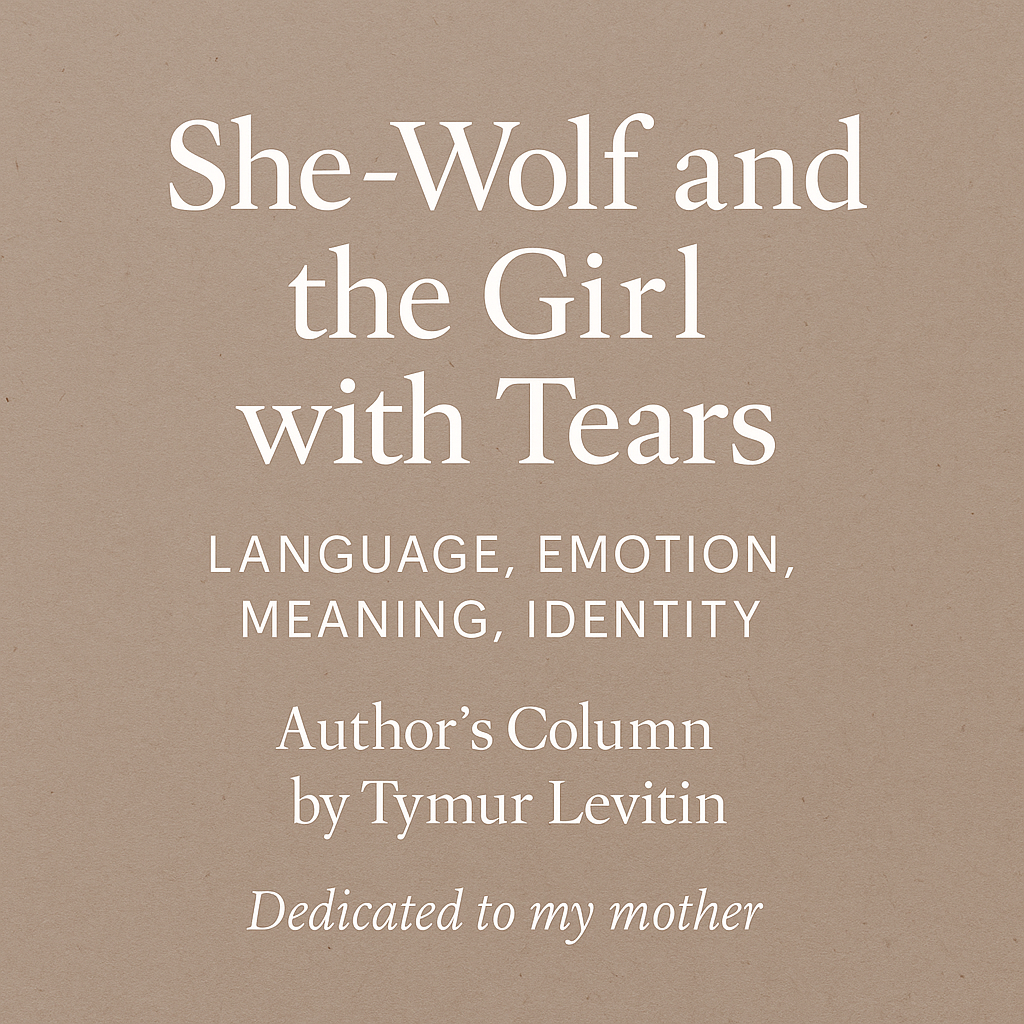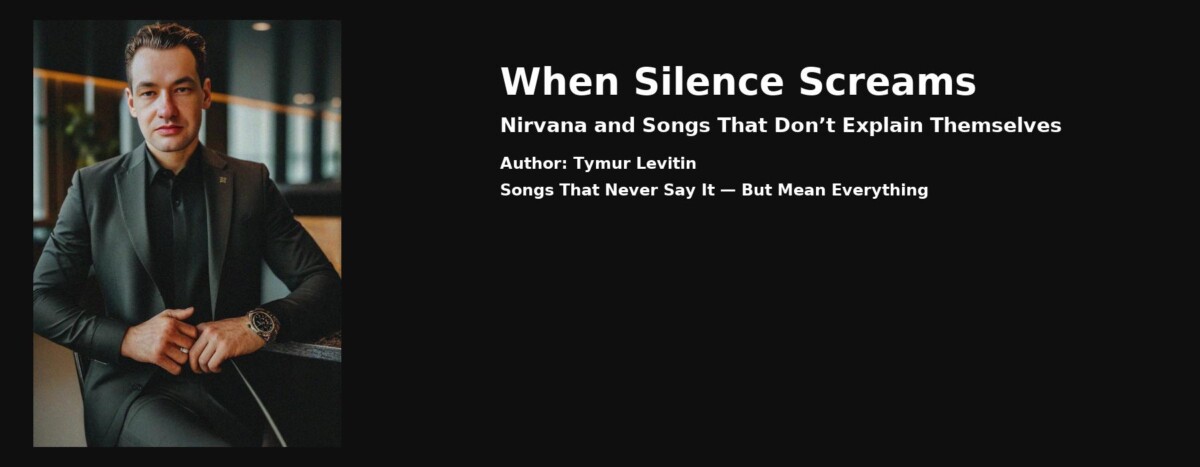Kolumna autorska Tymura Levitina
Seria: "Język. Tożsamość. Wybór. Znaczenie."
Wybierz język:
🔗 Czytaj po ukraińsku / Читати українською
🔗 Czytaj po rosyjsku / Читать по-русски
Wprowadzenie
To nie jest tylko opowieść o słowach.
To historia opowiedziana przez dorosłego mężczyznę.
Nauczyciel. Tłumaczem. Synem.
A zaczęło się od prostego pytania od studenta:
"Co tak naprawdę miał na myśli, nazywając ją "wilczycą"?"
To tam zaczyna się prawdziwe tłumaczenie - nie od słowników,
ale ze zrozumieniem tego, co było oznaczała nie tylko powiedział.
Nie tłumaczymy tekstów.
Tłumaczymy przestrzeń między liniami.
Wilczyca: męski głos o dorosłej kobiecie
Jest po prostu samotną wilczycą,
Nie każdy mężczyzna może zdobyć jej miłość.
Jest jak królowa, nieokiełznana i wolna.
Nie można jej kupić i nie można jej złamać.
To nie jest śpiewający chłopiec.
To mężczyznamówienie ciszą, a nie kontrolą.
Nie chce jej zmieniać. On rozpoznaje jej.
Ona nie błaga. Nie wyjaśnia. Nie bawi się.
Po prostu odchodzi - kiedy nie jest już widziana.
I jeśli kiedykolwiek spotkałeś taką kobietę,
nigdy jej nie zapomnisz.
🐱 Kot: głos młodej dziewczyny mówiącej do siebie
O czym ona marzy?
kiedy łzy spadają na jej rzęsy?
Kolejna noc bez snu...
a palenie w samotności boli.
To nie jest męski głos.
To młoda dziewczyna, próbująca zrozumieć swój własny smutek.
Wciąż otwarty, wciąż pełen nadziei, wciąż surowy.
Jej ból nie jest jeszcze kształtowany przez ciszę.
Próbuje to wypowiedzieć - całym ciałem.
🔹 Uwaga: W języku rosyjskim oryginalna linia brzmi "Что ей снится..."nie "О чём ей снится...".
"Что" to idiomatyczny i poetycki sposób zapytania o to, o czym marzy - "о чём" brzmiałoby tutaj nienaturalnie.
Dlaczego ma to znaczenie dla osób uczących się języka?
Ponieważ język nie jest neutralny.
Słowo w jednym języku może oznaczać szacunek, wstyd, czułość lub dumę w innym.
A jeśli chcesz mówić w jakimś języku - mów nim naprawdę.
musisz zrozumieć jak mówi do ciebie.
Kiedy uczeń mówi "ona jest wilczycą,"
Czy on ma na myśli, że jest zaciekła? Nietykalna? Tajemnicza? Seksualna?
A jeśli powie "mój mały kotek,"
Czy mówi to żartobliwie? A może przekracza granicę?
Dlatego nie tłumacz tekstów.
Tłumaczymy emocja za nimi.
🎓 Porównanie tłumaczeń: Wers "She-wolf"
Kiedy jej lód topnieje przed sercem, które płonie -
zapomni o bólu samotności...
| Język | Tłumaczenie | Komentarz |
|---|---|---|
| 🇬🇧 Angielski | Kiedy jej lód topnieje przed sercem, które płonie... | Zachowuje strukturę "przed". Lepsze niż "od" lub "z powodu". |
| 🇩🇪 niemiecki | Wenn ihr Eis vor einem brennenden Herzen schmilzt... | "Vor" = przed; elegancki, dosłowny, neutralny ton. |
| 🇺🇦 Ukraiński | Коли її лід перед палаючим серцем розтане... | Mocny, poetycki, wizualnie potężny. |
| 🇷🇺 Rosyjski | Когда её лёд перед сердцем горячим растает.... | Oryginalna linia. Wdzięczna i rytmiczna. |
| 🇪🇸 Hiszpański | Cuando su hielo se derrita ante un corazón ardiente... | Emocjonalny, bogaty. "Ante" jest formalny, ale skuteczny. |
| 🇫🇷 Francuski | Quand sa glace fondra devant un cœur brûlant... | Płynny, zdystansowany, poetycki. |
| 🇯🇵 Japoński | 彼女の氷が燃える心の前で溶けた時、孤独の痛みを忘れるだろう | Głęboko sugestywny, poetycki, pełen kulturowych niuansów. |
🎵 Porównanie tłumaczeń: "O czym ona marzy?" (Face2Face)
O czym ona marzy,
kiedy łzy spadają na jej rzęsy?
| Język | Tłumaczenie | Komentarz |
|---|---|---|
| 🇬🇧 Angielski | O czym ona marzy... | Przejrzysty, lekko miękki. |
| 🇩🇪 niemiecki | Co ją trapi, gdy na jej wimperze leżą trąby? | Bardzo precyzyjny, a jednocześnie zdystansowany. |
| 🇺🇦 Ukraiński | Що їй сниться, коли сльози на її віях? | Liryczny, żywy, muzykalny. |
| 🇷🇺 Rosyjski | Что ей снится, когда слёзы на ресницах? | Idiomatyczny, wzruszający, czuły. |
| 🇪🇸 Hiszpański | Czego się obawiasz, gdy pielgrzymi padają na twoje pestki? | Namiętny, płynny. |
| 🇫🇷 Francuski | Jak może być szczęśliwa, gdy na jej paznokciach pojawiają się lęki? | Miękkie i poetyckie. |
| 🇯🇵 Japoński | 彼女のまつげに涙がある時、彼女は何を夢見ているの? | Czuje się jak haiku. Poetycka powściągliwość. |
Kontrast: She-Wolf vs Cat
| Obraz | Głos | Generacja | Pozycja | Emocje |
|---|---|---|---|---|
| She-Wolf | Mężczyzna o kobiecie | Dojrzałość | "Szanuję ją" | Siła, cisza |
| 🐱 Kot | Dziewczyna o sobie | Młodzież | "Chcę być trzymany" | Smutek, wrażliwość |
Dla osób uczących się języków obcych
- Słowa to nigdy neutralny.
- Dosłowne tłumaczenie może zniekształcić wydźwięk emocjonalny.
- Gramatyka i składnia mają znaczenie - ale kontekst ma większe znaczenie.
- Język jest muzyką. Znaczenie żyje w rytmie i wahaniu.
- Tłumaczenie to nie kopiowanie - to wybór.
Powiązane artykuły:
- Jedno słowo - dwa światy: Dziewczyna, Dziecko, Detka
- Prawdziwy język nigdy nie jest dosłowny
- Gramatyka to sposób, w jaki myślimy
Dedykacja
🔹 Ten artykuł jest dedykowany mojej mamie -. Emma Yurievna Levitina.
Kobieta, która nigdy nie grała ról,
Nigdy nie udawał, nigdy o nic nie prosił.
Zrobiła to, co uważała za słuszne.
Zawsze.
Nie wiem, czy uczyniło mnie to lepszym, czy gorszym.
ale jestem tym, kim jestem.
Bo tak mnie wychowała.
I nie byłbym nikim innym.
© Tymur Levitin. Wszelkie prawa zastrzeżone.
Kolumna autorska Tymura Levitina - założyciela, dyrektora i głównego nauczyciela Levitin Language School.
























